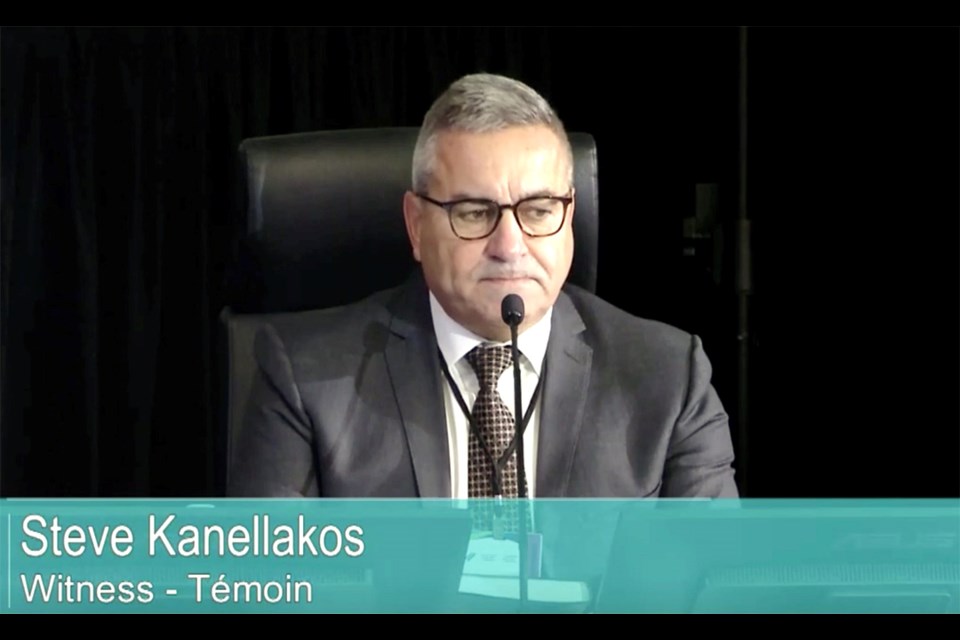OTTAWA – Days before Prime Minister Justin Trudeau invoked the Emergencies Act, the City of Ottawa had reached an agreement with convoy organizers to move trucks.
City of Ottawa Manager Steve Kanellakos testified at the inquiry Monday that the City of Ottawa had made a breakthrough with convoy organizers on Feb. 12. He told the inquiry that convoy organizers were moving trucks out of residential areas as agreed in their negotiations.
A text message from Kanellakos to convoy lawyer Keith Wilson revealed that it wasn’t the truckers’ fault that the agreement fell apart.
Convoy lawyer Brendan Miller asked Kanellakos: “The Mayor’s vision for how this would work out all trucks other than ones on Wellington would be moved out of town and that protesters would be shuttled in on busses from camps outside of town on a go forward?”
Kanellakos replied, “We were told that was an option.”
Miller than asked, “It was the police that prevented the deal from being executed?”
Kanellakos replied, “My opinion it was a broader context of circumstances and that the invocation of the [Emergenies Act] created new legal framework around Parliament Hill in that red zone and the authorities decided to step back.”
He said it was either the Ottawa Police Service or the Parliamentary Protective Service that blocked the plan to move the trucks out of residential areas.
The inquiry also revealed that an Ottawa Police Service intelligence officer’s briefing before the Freedom Convoy arrived in Ottawa indicated, “Their intention is to hold a peaceful demonstration and there is no indication of hostility.”
On Feb. 14 – the day the Emergencies Act was invoked - CSIS and Public Safety Canada internal memos both said there were no safety concerns.
The Government Operations Centre memo stated: “Approx 10 people on Parl Hill and approx. 100 on the surrounding streets.”
A CSIS memo said: “No concerns at this time.”
The Government Operations Centre’s overall assessment was that, “Majority of events have been peaceful. Since most government employees are working remotely the disruption to government activities is so far minor.”
A former physics professor and an Ottawa resident tweeted, “I live in the centre of Ottawa. I went to see the truckers and spent time with them several times. The media was reporting about events in another universe, an anti-universe where the opposite is true. The only significant inconveniences were the repeated wide police blockades!”
The hearings started Oct. 13 and are expected to run until Nov. 25 with 65 witnesses being called. Witnesses include Prime Minister Justin Trudeau, Deputy Prime Minister and Finance Minister Chrystia Freeland, Public Safety Minister Marco Mendicino, Justice Minister David Lametti, as well as representatives from Ottawa Police, Ontario Provincial Police, CSIS, and lawyers from the Justice Centre for Constitutional Freedoms. Members of the trucker convoy and freedom movement will also testify, including Pat King, Tamara Lich, Tom Marazzo, and Chris Barber.
Public participation
The public is invited to contact the commission. They can email [email protected] , or write Public Order Emergency Commission, c/o Main Floor Security Desk, 90 Sparks Street, Ottawa, ON K1A 0A3.
Submissions should be one or two pages, up to about five pages. The public may provide supporting materials, if any, as attachments.
The Commission accepts anonymous submissions but asks that you identify your country of residence. All submissions will be read and considered by the Commission, and your submission may be referred to or quoted by the Commission either in a written report or during the public hearings. No identifying information will be used without your express permission.
If you have any questions about sending comments please email your questions to [email protected]
Story corrected to say Emergencies Act.
— for more from Crime, Cops and Court.




